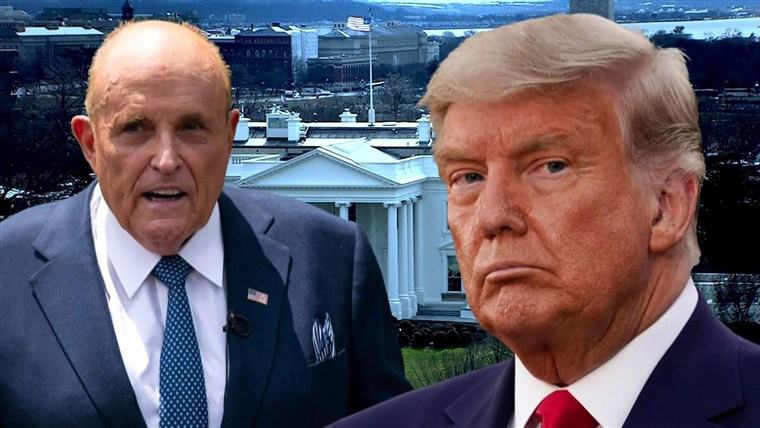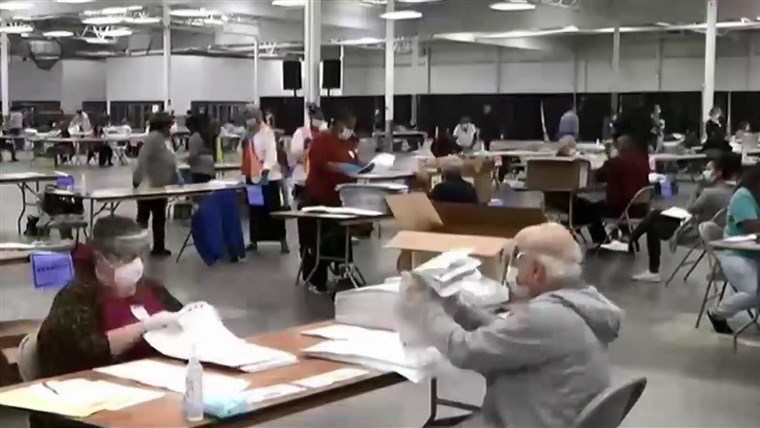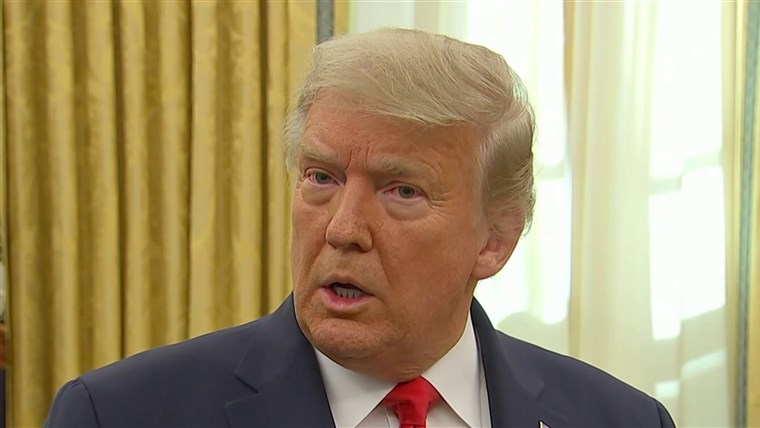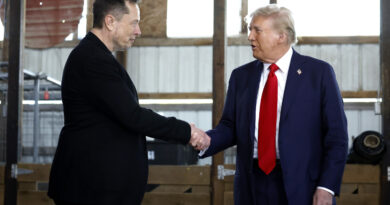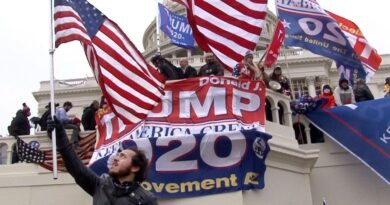Trump’s false fraud claims are laying groundwork for new voting restrictions, experts warn
Even before the final votes in the 2020 election were tallied, President Donald Trump sent his attorneys to court alleging voter fraud.
When it became clear that he had lost to President-elect Joe Biden, his claims — and his campaign’s court filings — accelerated. Trump attacked cities with large shares of Black voters, who had come out in force for Biden, while his lawyers baselessly alleged a global conspiracy and filed dozens of suits in six states.
The legal strategy failed in court after court — not a single incident of voter fraud has been proven in the lawsuits — but experts warn the narrative is laying the groundwork for disenfranchisement of voters across the country.
“I don’t actually think that all of this leads to a different result in January, but I am really afraid about what Donald Trump is currently doing to the country for February and beyond,” said Justin Levitt, an election law expert and professor at Loyola Law School who worked at the Department of Justice during the Obama administration.
Despite the large body of evidence that American elections are secure from both hacking and widespread voter fraud, federal and state politicians are already proposing new laws that will make it harder to vote.
“We’re already seeing trial balloons of new measures to restrict access to voting, and I expect that this false narrative of voter fraud is going to be used as an excuse in many other places to try and drive an anti-voter agenda going forward,” said Wendy Weiser, vice president of the Democracy Program at the Brennan Center for Justice at the NYU School of Law.
In Georgia, a traditionally red state that Biden flipped blue this year by more than 12,000 votes, Secretary of State Brad Raffensperger, a Republican, has proposed several major election changes, including adding a voter ID requirement to mail-in voting and making it easier to challenge a voter’s stated residency.
“Close elections sow distrust,” Raffensperger said on Nov. 20, announcing that a hand recount had shifted Biden’s margin of victory in the state but had not changed the outcome. “People feel like their side was cheated.”
A second recount followed in the state, affirming the same result.
Another Republican official in his office, Gabriel Sterling, later forcefully condemned the president and other Republicans’ rhetoric around a “stolen” or “rigged” election, which he said has incited harassment of election officials and death threats.
Mail-in voting, voter purges and more
Much like the onslaught of litigation aimed at restricting or expanding mail-in voting ahead of Nov. 3, expect lawmakers to propose a slew of new laws affecting such balloting.
“There will be legislation both increasing the barriers to mail voting and trying to make it easier to vote by mail — we’ll see legislation on both sides of that,” Weiser said.
She said she’ll be watching for the kind of legislative proposals the Trump campaign fought for in court: restricting who can use mail-in voting, voter ID, limiting drop boxes, and the ability for voters to “cure,” or fix, ballots containing small errors, such as a missing signature, so they can still be counted.
Levitt said he expects some jurisdictions will do voter purges — removing some people from their registration lists. It’s a normal part of election administration but can disenfranchise eligible voters when it is done too aggressively.
“We’ve seen in the current lawsuits, allegations that the voter rolls are full of fraudulent voters. I think you will see symbiotically, post-election efforts to purge the voter rolls that talk about ‘all of the fraud that happened in 2020’ — heavy air quotes,” he told NBC News.
Weiser said ballot restrictions won’t happen in a vacuum — the 2020 election cycle educated a lot of voters about the voting process.
“Americans have become much more aware of their voting systems and the mechanics of the voting process and the way in which it works and the options available to them, and therefore have become bigger stakeholders in that process,” she said. “That’s a positive impact that we’ll see.”
Targeting mail-in voting
Prominent Republicans — many who have still refused to acknowledge Biden as the president-elect — have joined Trump in sowing mistrust in the election system. Some have called for a nationwide crackdown on mail-in voting, a regularly used form of civic participation that more Americans than usual took advantage of in 2020 due to the health risks of congregating at the polls amid the coronavirus pandemic.
In a recent Twitter thread, Rep. Dan Crenshaw, R-Texas, called for limiting mail-in voting nationwide and adding voter ID requirements and a national voter database. Sen. Rand Paul, R-Ky., tweeted a link to a misleading blog post about “anomalies in vote counts.”
“Fraud? Look at the evidence and decide for yourself,” he tweeted.
The president and his allies like Paul have repeatedly ignored the facts with claims about improper “vote dumps,” NBC News has reported. In the lead-up to Election Day, Trump repeatedly railed against mail-in ballots, issuing still-unsubstantiated warnings of mass fraud.
Conversely, Democrats have vowed to restore the part of the Voting Rights Act that was gutted by a Supreme Court ruling in 2013 in Shelby County v. Holder, with an updated version named for Rep. John Lewis, D-Ga., the civil rights icon and voting rights advocate. The law would update the outdated formula determining which areas have a history of discrimination and thus should be required to prove that changes to voting are not discriminatory. Biden has vowed to sign it as president, something the Democrats could do only if they retake the Senate after January’s runoff races in Georgia.
Trump’s baseless claims of a stolen election were unsurprising. When he won in 2016, he insisted he’d lost the popular vote only because of voter fraud that no one, including his own presidential task force, could find. But experts fear he’s rallying a generation of supporters to fight against a threat that doesn’t exist.
And coming from a president whose political career kicked off with the racist birther claims about President Barack Obama, it’s impossible to ignore the fact that restrictive voter laws often disproportionately disenfranchise the Black voters who came out in force for Biden.
“Often, efforts to root out voter fraud are thinly-veiled dog whistles to try to undermine Black and brown voters,” Weiser said. “President Trump’s efforts … make it less thinly veiled.”
Trump and his attorneys have particularly blamed fraud on cities with large shares of Black voters, such as Detroit, Philadelphia and Atlanta, alleging a national conspiracy.
“The only surprise I would have found in this is if Philadelphia hadn’t cheated in this election because for the last 60 years they’ve cheated in just about every single election,” Trump attorney Rudy Giuliani baselessly claimed Nov. 19 during a freewheeling press conference at the Republican National Committee headquarters in Washington. “You could say the same thing about Detroit.”
Restrictive laws historically follow periods of advancement
For more than 100 years, voter fraud claims have cued up tighter rules.
“Voter suppression efforts are almost always accompanied or preceded by claims of voter fraud,” said Alex Keyssar, a professor at the Harvard Kennedy School and the author of “The Right to Vote: The Contested History of Democracy in the United States.”
Trump’s claims “could easily lead to significant voter suppression,” he said.
Keyssar said there have been two major periods of voter suppression in American history, and both followed periods of empowerment of Black Americans and large-scale immigration. After the 15th Amendment and Reconstruction began to empower Black voters and politicians, Jim Crow laws systematically disenfranchised Black voters with poll taxes and literacy taxes.
The Voting Rights Act — passed in 1965, in the wake of the civil rights march known as “Bloody Sunday” and reauthorized four times by presidents in both parties— ensured Black Americans’ voting rights over several decades.
But it also led to more modern forms of voter suppression, voting rights experts say. The last two decades have seen aggressive purging of voters from the rolls, restrictive registration rules, voter ID laws, aggressive gerrymandering and more. The mostly Republican proponents of these measures say they are necessary to secure the vote and prevent fraud, with critics, including Democratic lawmakers and civil rights groups, arguing these measures successfully have kept eligible voters from the polls for a problem that doesn’t exist.
Race and immigration were central issues in the 2020 election, which took place amid a national racial reckoning as Americans stood up in protest against mistreatment of Black Americans at the hands of police. Vice President-elect Kamala Harris is the first Black American, the first woman and the first South Asian American to be elected vice president, too, facing racist attacks during the campaign.
In October, Sen. David Perdue, R-Ga., mockingly mispronounced Harris’ first name repeatedly before adding “whatever!” while speaking at a Trump rally. (A representative for Perdue claimed the Republican senator simply mispronounced her name and “didn’t mean anything by it.”)
Both Perdue and his Republican colleague, Sen. Kelly Loeffler, were forced into runoffs, facing Democratic challengers Jon Ossoff and Raphael Warnock, respectively, Jan. 5.
“The attacks on Kamala Harris, the attacks on her name, reflect that — she’s an ‘other,’ she has an unpronounceable name,” Keyssar said.
Keyssar said 2020 fits the mold, the kind of ongoing societal clashes that have fueled voter suppression in the past. And while experts agree the modern period of voter suppression hasn’t yet ended, it’s clear that Trump’s claims of a “stolen” election will intensify its battles anew.
“He amplified the public conversation around voter fraud, he made that more of a household conversation, and he has increased the salience of voting restrictions for his supporters,” Weiser said. “In that way, he made it a lot worse.”
*** This article has been archived for your research. The original version from NBC News can be found here ***
